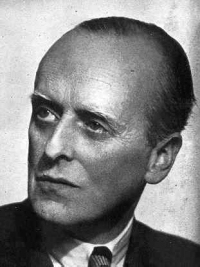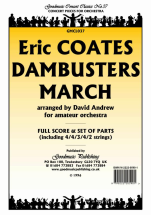Dam Busters March
Buy this item (in stock)
Product ID: GM1 CL037
By Eric Coates
published: 1954
Publisher:
Goodmusic
Arranger:
Andrew
Series:
Concert Classics
Genre:
March, Film Score
Line Up:
Symphony Orchestra
Duration:
4:00
Level: 3
Set & Score
This item is in stock
About this item
This popular march was written for the film "The Dam Busters" about the wartime exploits of the R.A.F.'s 617 squadron and their attempts to destroy the dams in Germany's industrial heartland using the "bouncing bomb", a secret weapon invented by Barnes-Wallis. No secret weapons are required to perform this arrangement, just a reasonably able orchestra! Saxophone parts are provided as alternatives (or additions) to the horn parts. The 3rd violin doubles the viola (where necessary at the octave) and either may be omitted.
Instrumentation
2 Flutes, 2 Oboes, 3 Clarinets in Bb, 2 Bassoons 2 Horns in F (or Alto saxes in Eb or Tenor saxes in Bb), 3 Trumpets in Bb, 2 Trombones, Tuba, Timpani, Percussion (Triangle, Cymbals, Side Drum, Bass drum) Strings (Violin 1, Violin 2, Viola or Violin
Reviews and rating
No review available, be the first to write one!

Composer
Eric Coates (1886-1957)

Eric Coates (27 August 1886 – 21 December 1957) was an English composer of light music and a viola player.
Eric was born in Hucknall in Nottinghamshire.
After studying at home with a governess, Eric enrolled (1906) at the Royal Academy of Music in London, where he received viola lessons from Lionel Tertis and studied composition with Frederick Corder. From 1910 he played in the Queen's Hall Orchestra under Henry Wood, becoming principal violist in 1912, "... which post I held for seven years," he said, speaking in a 1948 BBC radio interview, "until, I regret to say, I was dismissed through sending deputies to take my place when I was conducting my works elsewhere. Henry Wood little knew what a great help he had been to me by dispensing with my services, for from that day I never touched my viola again and was able to devote all my time to my writing."
He had an early success with the overture The Merrymakers (1922), but more popular was the London Suite (1933).
More info about the composer...



 Click above to view samples
Click above to view samples
